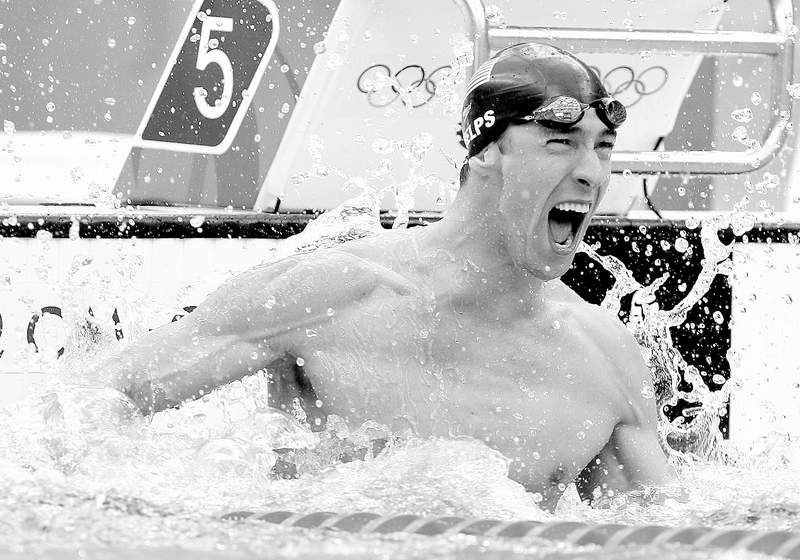Phelps gets No. 7
Published 5:00 am Saturday, August 16, 2008

- The United States’ Michael Phelps reacts as he wins gold in the men’s 100-meter butterfly during the swimming competitions in the National Aquatics Center at the 2008 Olympics in Beijing on Saturday. Phelps won by .01 second.
BEIJING — With history hanging in the balance, Michael Phelps decided to take one more stroke. His long arms soared above the water, windmilled past his ears and slammed into the wall.
In the next lane, Milorad Cavic was gliding to the finish, just inches from the gold, his arms no longer driving but just reaching for the end.
Trending
That’s all Phelps needed. He didn’t have to be the fastest. Just first.
Phelps swam into history with a magnificent finish Saturday, tying Mark Spitz with his seventh gold medal by the narrowest of margins in the 100-meter butterfly.
He got his hands on the wall a hundredth of a second ahead of Cavic — a finish so close the Serbians filed a protest and swimming’s governing body had to review the tape down to the 10-thousandth of a second.
“I had no idea,” Phelps said. “I was starting to hurt a little bit with probably the last 10 meters. That was my last individual race, so I was just trying to finish as strong as I could.”
Phelps’ time was 50.58 seconds, the only time in these Olympics that he won an event without breaking the world record.
Not to worry.
Trending
The 23-year-old from Baltimore has now pulled even with the greatest of Olympic records, matching Spitz’s performance in the 1972 Munich Games.
“One word: epic,” Spitz told The Associated Press from Detroit. “It goes to show you that not only is this guy the greatest swimmer of all time and the greatest Olympian of all time, he’s maybe the greatest athlete of all time. He’s the greatest racer who ever walked the planet.”
Call it the Great Haul of China — and it’s not done yet.
Phelps will return on Sunday to swim in his final event of these games, taking the butterfly leg of the 400 medley relay. The Americans will be heavily favored to give him his eighth gold, leaving Spitz behind.
Andrew Lauterstein of Australia won the bronze medal in 51.12. American Ian Crocker was again denied the first individual gold of his career; he didn’t even win a medal, finishing fourth by a hundredth of a second in 51.13.
“It was a tight one,” Crocker said. “I saw my short differential between getting a medal or not, but then I realized Michael’s was pretty close, too. I’m really glad that he came out on top.
“It was everything that an Olympic final should be. It doesn’t matter who’s in the heats, you just got to get out and race and it’s anybody’s game. It was one of the more intense races that I’ve been in, which makes it a great way to end the meet.”
Overshadowed by Phelps, two more world records fell on the next-to-last day of swimming — the 22nd and 23rd of a lightning-quick week.
Rebecca Adlington of Britain won gold in the 800 freestyle, breaking Janet Evans’ 19-year-old world record — the oldest in swimming.
Adlington touched in 8:14.10 to crush the mark of 8:16.22 set by the American in Tokyo on Aug. 20, 1989. Alessia Filippi of Italy took the silver and Lotte Friis of Denmark the bronze.
Kirsty Coventry of Zimbabwe finally won a gold in Beijing, defending her Olympic title in the 200 backstroke with a world record of 2:05.24. She lowered the mark of 2:06.09 set by Margaret Hoelzer at the U.S. trials last month.
Hoelzer not only lost her record but had to settle for silver. Reiko Nakamura of Japan earned the bronze.
No one was happier that Cesar Cielo, who won Brazil’s first swimming gold with an upset in the 50 freestyle. He broke down crying on the medal stand and was mobbed by his teammates on deck.
He won in 21.30, lowering his own Olympic mark of 21.34 that he set in the semifinals. Amaury Leveaux of France took the silver in 21.45. Alain Bernard of France, the 100-meter champion, won bronze in 21.49.
Also, 41-year-old Dara Torres of the U.S. cruised into the final of the 50 free with the fastest semifinal time, 24.27. Australian teenager Cate Campbell was second at 24.42.
The final is Sunday, the wrapup to a thrilling competition at the Water Cube.
Most Olympic gold medals
Career
13 — Michael Phelps, United States, swimming (2004: 6; 2008: 7)
9 — Paavo Nurmi, Finland, track and field (1920: 3; 1924: 4; 1928: 2)
9 — Larysa Latynina, Soviet Union, gymnastics (1956: 4; 1960: 3; 1964: 2)
9 — Mark Spitz, United States, swimming (1968: 2; 1972: 7)
9 — Carl Lewis, United States, track and field (1984: 4; 1988: 2; 1992-2; 1996: 1)








